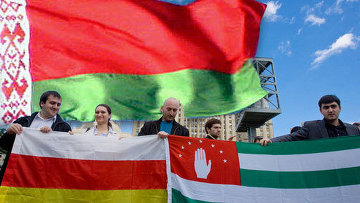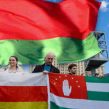
Minsk Forum Raises New Questions
Publication: Eurasia Daily Monitor Volume: 6 Issue: 207
By:

The Minsk Forum has become a regular feature of the late fall in the Belarusian capital. Each November, an increasingly large gathering –including diplomats, politicians, academics, and business people from more than 20 countries this year– assembles to discuss a variety of issues, with its focus on E.U. relations with Belarus and the prospects for democratization in the country. For the second year in succession, the head of the presidential administration, Uladzimir Makei, attended the proceedings. In 2008 he was bombarded with questions, but this year he seems to have had a warmer reception. The forum, which was initiated and is still chaired by German scholar Rainer Lindner, mirrors the efforts of the Eastern Partnership Project to develop closer ties with Belarus. On the horizon –before the end of November– is the prospect that the Council of the E.U. will remove all formerly imposed sanctions on Belarus, which are currently suspended. Speakers at the Forum were insistent that Europeans have not compromised any principles in the new policy of engagement with the Lukashenka regime.
Thus, German MP Mariluise Beck, in a speech at the forum, emphasized the significance of freedom of the media, open work with informal associations, and freedom for political parties in Belarus. Charge d’affaires of the Delegation of the European Commission to Belarus, Jean-Eric Holzapfel, stressed that the Europeans have not forgotten the original 12 principles they elaborated in order for full working relations to be established with the Minsk government (www.charter97.org, November 6).
One question raised by the forum was the issue of Belarus’ recognition of Abkhazia and South Ossetia, the breakaway regions of Georgia. Only three countries to date have recognized their independence, namely Russia, Nicaragua, and Venezuela. Swedish ambassador Stefan Eriksson praised the Belarusian government for its stance to date, despite pressure from Russia to take such a step (Belapan, November 6).
There is every indication that the E.U. will remove the sanctions permanently. It has recently lifted similar sanctions on Uzbekistan, which has a much worse human rights record than Belarus. The E.U. has also found in Belarus an amenable partner: the Lukashenka administration is happy to trade and talk with the Europeans, and in particular it would like to see the elimination of the restrictive visa regime, which requires 60 Euros ($90) for entry of Belarusians into the Schengen zone (Narodnaya Hazeta, November 9). The vast majority of Belarusian residents would favor such a step. On the other hand, the Belarusians are not prepared to change either the nature of their regime or their foreign policy. They have never wavered from this position.
Thus, speaking at the forum, Makei stated that Belarus’ participation in the Eastern Partnership Project does not signify a change in foreign policy. Similarly, Uladzimir Ulakhovich, the Director of the Center for International Research at the Belarusian State University, commented that the Belarusians favor pragmatism and the lifting of barriers and restrictions to trade between Belarus and the countries of the E.U. (Narodnaya Hazeta, November 9). He also reported (November 4) that the Belarusian parliament will consider recognizing South Ossetia and Abkhazia. On the following day, the legislature formed a working group that is to travel to these regions to examine the situation at first hand. The move seems illogical, if Belarus is really paying attention to the comments made at the Minsk Forum (www.charter97.org, November 4-5).
On November 4, President Alyaksandr Lukashenka stated that the E.U. and other international organizations, as well as European governments, were beginning to recognize that it was necessary to treat Belarus as an equal partner (Belarusian Telegraph Agency, November 4). From his perspective, that status signifies that it is not the place of the E.U. or the EPP to impose any conditions on his country. It seems evident that the position of Belarus is to maintain relations with both Russia and the E.U., using the former as a major political partner and the latter as a source of trade and extra income.
Meanwhile, some political parties are still struggling for recognition. A case in point is the Belarusian Christian Democratic Party, a radical rightist organization that campaigns against abortion and “for family values.” Having been turned down twice by the ministry of justice, the party leaders considered holding a repeated founding congress in Kastrichnitskaya Square in the center of Minsk. However, on October 31, it held a more formal meeting and again applied for registration (Belorusy i Rynok, November 2-8). Pressure on political parties opposed to the government remains intense. One of the leaders of the BCDP, Pavel Sevyarinets, has frequently been harassed and arrested.
One can hardly blame Lukashenka for exploiting the vacillation and uncertainty of Europeans, whose policies have been markedly inconsistent. One wonders, however, whether the latter really believe that the Belarusian government pays any attention to issues of human rights or democratization. It has no need to do so when it has maneuvered itself into a very favorable position without reforms or developing a more tolerant society. As analyst Uladzimir Padhol told Jamestown, those opposition factions that do not back membership in the EPP with minimal concessions on the part of Minsk, are consigned to the role of dissidents in their own country, increasingly marginalized if not ignored altogether. That is what the government has been seeking for the past thirteen years and it is now very close to attaining its goal.




